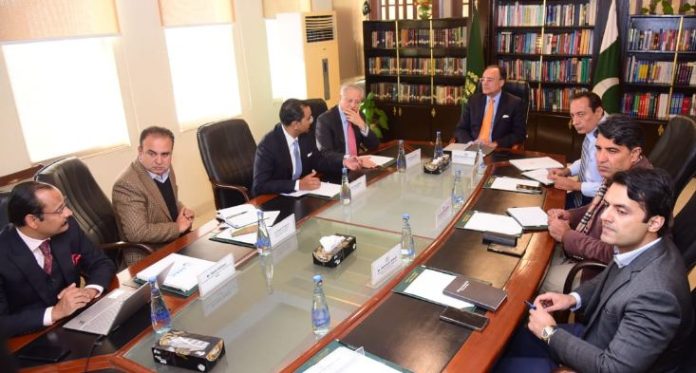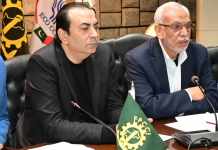ISLAMABAD, JAN 15 /DNA/ – Federal Minister for Finance and Revenue, Senator Muhammad Aurangzeb, chaired a meeting with the leadership of the Pakistan Microfinance Investment Company (PMIC). The PMIC delegation was led by Mr. Naveed A. Khan, Chairman PMIC, and included Mr. Yasir Ashfaque, CEO PMIC; Mr. Waqas ul Hassan, CEO Karandaaz Pakistan; and Mr. Saqib Siddique, Head of Portfolio & Sector Development, PMIC.
PMIC, established in 2016 under the National Financial Inclusion Strategy (NFIS), operates as a wholesale microfinance apex with the aim of enhancing financial inclusion across Pakistan. During the meeting, the PMIC team presented a detailed overview of the microfinance landscape, highlighting key challenges and opportunities. It was noted that Pakistan significantly lags behind regional counterparts, such as Bangladesh, India, and the Philippines, in terms of financial inclusion, with a potential microcredit market of 41 million, of which only 7.4 million clients are currently served.
The discussion included a comparative analysis of Microfinance Institutions (MFIs) and Microfinance Banks (MFBs). The team highlighted that while MFBs primarily lend against gold and offer nano loans, MFIs focus on rural communities and cater to underserved segments, particularly women.
Several key challenges to financial inclusion were outlined, including:
1. Dual Regulatory Framework: MFIs and MFBs operate under separate regulations, complicating the ecosystem.
2. Limited Access to Funding: Substantial liquidity is required to expand outreach, but funding remains a challenge.
3. Insufficient Institutional Capacity: The limited number of entities in the sector hinders widespread financial access.
4. Low NFIS Target Ownership: Proactive oversight is needed to meet the ambitious targets of the newly drafted NFIS 2024-28.
The Finance Minister appreciated the insights shared and stressed the importance of addressing these challenges with realistic and practical solutions. He encouraged PMIC to propose innovative funding mechanisms, such as equity endowment funds and targeted government-mandated allocations, to increase the sector’s capacity and outreach.
He reiterated the government’s commitment to accelerating financial inclusion as a cornerstone of sustainable economic development. The meeting concluded with a shared resolve to work collaboratively towards enhancing access to financial services, especially for rural and underserved populations, in alignment with the NFIS goals.

















